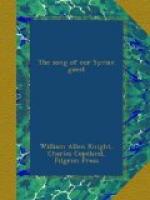“It seems to us,” I added, wishing to give suitable support to my lady’s rather brave declaration of our sense of a literary flaw in the matchless psalm, “it seems to us to lose the sweet, simple melody and to close with strange, heavy chords when it changes to a scene of banquet hospitality. Do you mean that it actually keeps the shepherd figure to the end?”
“Certainly, good friends.”
With keen personal interest I asked him to tell us how we might see it as a shepherd psalm throughout. So we listened and he talked, over the cooling teacups.
“It is all, all a simple shepherd psalm,” he began. “See how it runs through the round of shepherd life from first word to last.”
“With softly modulated voice that had the rhythm of music and the hush of veneration in it, he quoted: “’The Lord is my shepherd; I shall not want.’”
“There is the opening strain of its music; in that chord is sounded the keynote which is never lost till the plaintive melody dies away at the song’s end. All that follows is that thought put in varying light.”
I wish it were possible to reproduce here the light in his face and the interchange of tones in his mellow voice as he went on. He talked of how the varied needs of the sheep and the many-sided care of the shepherd are pictured with masterly touch in the short sentences of the psalm.
“Each is distinct and adds something too precious to be merged and lost,” he said.
“’He maketh me to lie down in green pastures,’—nourishment, rest. ’He leadeth me beside the still waters,’—the scene changes and so does the meaning. You think here of quietly flowing streams; so you get one more picture of rest; but you miss one of the finest scenes in shepherd life and one of the rarest blessings of the soul that is led of God. All through the day’s roaming the shepherd keeps one thing in mind. He must lead his flock to a drinking-place. The refreshment of good water makes the coveted hour of all the day; the spot where it is found amid the rough, waterless hills and plains is the crowning token of the shepherd’s unfailing thoughtfulness. When at last the sheep are led ’beside the still waters,’ how good it is, after the dust and heat of the sheep-walks!
“Would you get the shepherd meaning here? Then remember that streams are few in the shepherd country of Bible lands. The shepherds do not rely on them. Even where streams are found, their beds and banks are usually broken and their flow rough. Sheep are timid and fear a current of water, as they well may for they are easily carried down stream because of their wool.”
“Poor things, how do they ever get a good drink?” exclaimed one of the two little maids, whose heart was always open lovingly to animals.
“The shepherd sees to that, doesn’t he?” said the other timidly, with earnest eyes set on our guest.
His face beamed with winsome relish of these tributes to his success. “Yes, the sheep would indeed have a hard time finding water to drink, were it not that the shepherd sees to that.”




